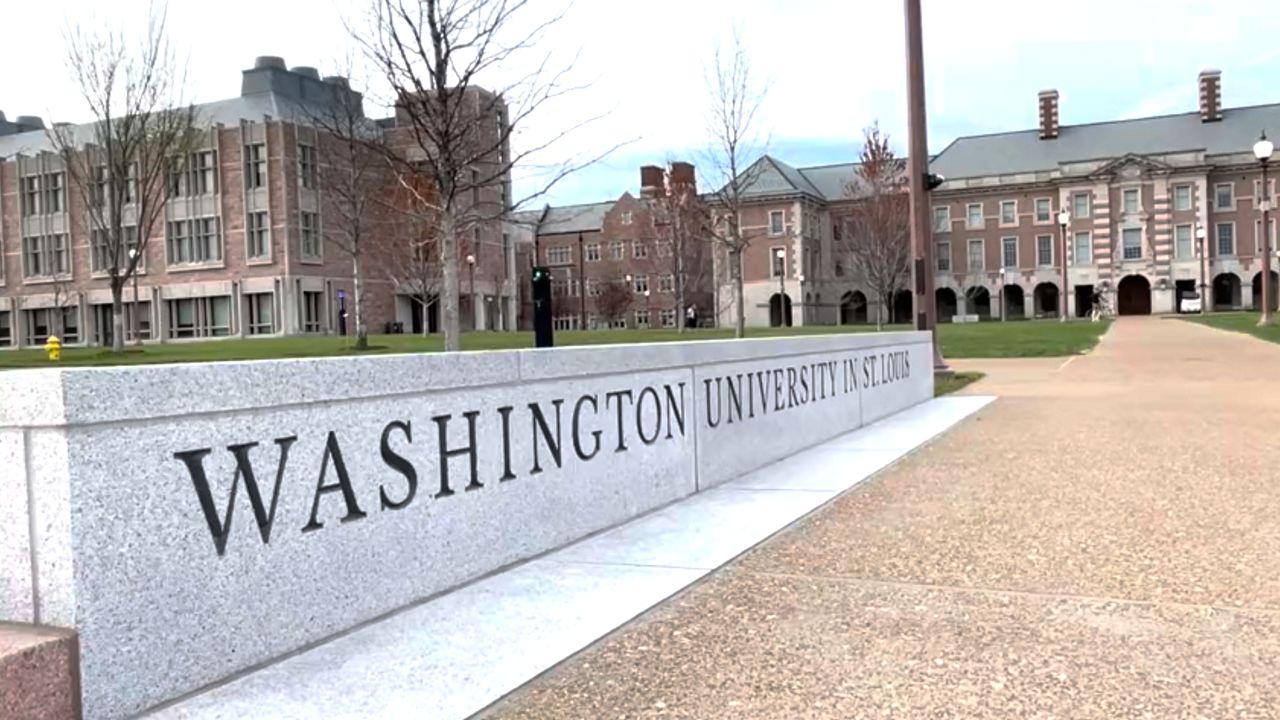Washington University has notified students who were arrested during a protest Saturday over the Israel-Hamas war that they have been temporarily suspended and banned from campus while the disciplinary process plays out. Authorities arrested 100 demonsrators Saturday.
The Riverfront Times reported more than 80 people were arrested during the protest that began in public areas before moving to the campus in the afternoon. Megan Green, president of the St. Louis Board of Aldermen, said in a social media post that she was present and the protest remained calm “until the police came in like an ambush.”
The St. Louis Police Department said in a social media post that it assisted campus police, although city officers did not make any arrests.
The college issued a statement on the protests and arrests, saying:
"On Saturday, April 27, a large group of individuals entered the Washington University campus with the intention of causing a significant disruption to the university. The group, which included WashU students and employees as well as many individuals not affiliated with the university, marched to multiple campus locations, pitched tents, and indicated that they did not intend to leave. They also put out a call for more people to come to campus to join their demonstration.
It quickly became clear through the words and actions of this group that they did not have good intentions on our campus and that this demonstration had the potential to get out of control and become dangerous. When the group began to set up a camp in violation of university policy, we made the decision to tell everyone present that they needed to leave. We arrested 100 individuals who refused to leave after being asked multiple times. This number includes 23 WashU students and 4 university employees. All face charges of trespassing and some may also be charged with resisting arrest and assault, including for injuries to three police officers who sustained injuries including a severe concussion, a broken finger and a groin injury.
We are firmly committed to free expression and allow ample opportunity for voices to be heard on our campus. However, we expect everyone to respect our policies and we will take swift action to enforce them to their fullest extent."
The school did not respond to a request for comment on the suspensions, which also include removal from university housing.
According to a copy of a letter obtained by Spectrum News, the school said the move is authorized its Student Conduct Code.
"Your continued presence on campus poses a substantialthreat to the ability of faculty and other students to continue to their normal University functions and activities. THe reported behavior is of serious concern to the University," it said in part.
Impacted students can finish their coursework for the year and final exams remotely if permitted by their professors.
Protests are roiling college campuses nationwide as administrators with graduation ceremonies next month face demands that schools cut financial ties to Israel against the backdrop of the Israel-Hamas war.
Many campuses were largely quiet by early afternoon Sunday but about 275 people were arrested on Saturday at campuses including Indiana University at Bloomington and Arizona State University. Those have pushed the number of arrests nationwide to nearly 900 since New York police removed a pro-Palestinian protest encampment at Columbia University and arrested more than 100 demonstrators on April 18.
Since then, students have dug in at dozens of pro-Palestinian encampments around the country, prompting a range of responses from administrators — arrests and criminal charges, student suspensions or simply continued pleas to leave. The plight of students has become a central part of protests, with both the students and a growing number of faculty demanding amnesty. At issue is whether the suspensions and legal records will follow students through their adult lives.
Faculty members at universities in California, Georgia and Texas have initiated or passed largely symbolic votes of no confidence in their leadership.
White House national security spokesman John Kirby said President Joe Biden “knows that there are very strong feelings” but would leave managing the protests to local authorities.
“People should have the ability to air their views and to share their perspectives publicly but it has to be peaceful," Kirby said on ABC’s ”This Week.”
In an interview that aired Sunday, Senate Republican Leader Mitch McConnell called it “a dangerous situation” and placed the responsibility with college administrators.
“There’s also antisemitism, which is completely unacceptable. I’ve been shocked to see that in this country,” he said on NBC’s “Meet the Press.”
The nationwide campus protests began in response to Israel's offensive in Gaza. Hamas launched a deadly attack on southern Israel on Oct. 7, when militants killed about 1,200 people, most of them civilians, and took roughly 250 hostages. Vowing to stamp out Hamas, Israel launched an offensive in Gaza. In the ensuing war, Israel has killed more than 34,000 Palestinians in the Gaza Strip, according to the local health ministry.
Israel and its supporters have branded the university protests as antisemitic, while critics of Israel say it uses such allegations to silence opponents. Although some protesters have been caught on camera making antisemitic remarks or violent threats, organizers of the protests, some of whom are Jewish, say it is a peaceful movement aimed at defending Palestinian rights and protesting the war.



